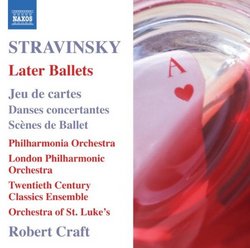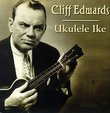| All Artists: Igor Stravinsky, Robert Craft, Twentieth Century Classics Ensemble, Philharmonia Orchestra of London, Orchestra of St. Luke's, London Philharmonic Orchestra, Mark Wait Title: Stravinsky: Later Ballets Members Wishing: 0 Total Copies: 0 Label: Naxos Original Release Date: 1/1/2007 Re-Release Date: 12/11/2007 Genre: Classical Styles: Ballets & Dances, Ballets, Forms & Genres, Concertos, Historical Periods, Modern, 20th, & 21st Century, Instruments, Keyboard, Symphonies Number of Discs: 1 SwapaCD Credits: 1 UPC: 747313250622 |
Search - Igor Stravinsky, Robert Craft, Twentieth Century Classics Ensemble :: Stravinsky: Later Ballets
 | Igor Stravinsky, Robert Craft, Twentieth Century Classics Ensemble Stravinsky: Later Ballets Genre: Classical
|
Larger Image |
CD DetailsSimilar CDs
|
CD ReviewsPrecious Gems from the Neoclassic Stravinsky J Scott Morrison | Middlebury VT, USA | 12/19/2007 (5 out of 5 stars) "Is there any doubt that Robert Craft is the reigning Stravinsky conductor of our time? His years of friendship with, apprenticeship to and quasi-adoption by Stravinsky certainly give him bona fides for this, but it is his impeccable musicianship that tells here. These performances have appeared before on CD -- Jeu de cartes and Danses concertantes on Koch, and the Scènes de Ballet, Variations, and Capriccio on MusicMasters -- all recorded in the 1990s. Naxos is in the process of re-releasing on their own label all of Craft's Stravinsky recordings of that period (plus a few new ones done specifically for them) and the series is an undiluted triumph. This disc is simply stunning. I compared Craft's recordings of various of these works with those with Stravinsky conducting, and there is little to choose between them except that the Craft performances are universally better recorded and in some instances (e.g., Jeu de Cartes) better played. On this CD, the two works written before Stravinsky moved to America -- Jeu de Cartes and Capriccio for Piano and Orchestra -- bookend the later ballets written in California (at 1260 N. Wetherly, Beverly Hills to be precise). The pianist in Capriccio is the superb American, Mark Wait, who specializes in twentieth-century works. (Those who know Balanchine's 'Jewels' will recognize Capriccio as the music for that happiest of all Balanchine/Stravinsky ballets). Danses concertantes was the first full score Stravinsky wrote in California (1941-42)and its middle movement, Thème varié, has an American flavor. It was not long after its concert premiere that Balanchine choreographed it. Scènes de Ballet was written for Broadway, choreographed by Anton Dolin for Billy Rose's 1944 'The Seven Lively Arts', but of course it has taken on a life of its own, particularly with British companies, as re-choreographed by Frederick Ashton. Variations is a five-minute set of variations on a twelve-tone row, but lest that put you off, it still sounds like the Stravinsky we know and love, as does his other twelve-tone ballet, Agon. The performances here are by four different ensembles -- the Philharmonia (Jeu), 20th Century Classics Ensemble (Danses), Orchestra of St. Lukes (Scènes & Capriccio), and London Philharmonic (Variations). Each is superb. All thanks to Naxos for putting these wonderful performances back in circulation, and at a budget price. Scott Morrison" Stravinsky + Craft = Near-Perfect Combination Eric S. Kim | Southern California | 07/15/2009 (5 out of 5 stars) "The first Stravinsky recording I've ever bought that had Robert Craft as the conductor was The Rite of Spring, with the London Symphony Orchestra. At first, I found myself disappointed with Craft's interpretation, mainly because it sounded weak at the time (especially the Safricial Dance). But a few years pass, and now this specific Rite recording has grown on me. While I still find Craft's swift rendering of the more lyrical passages a bit odd, the piece is just as intense and violent as most other successful recordings. As of 2009, I find Robert Craft to be one of the, if not THE, definitive Stravinsky conductor. I now own his interpretations of Stravinsky's Greek ballets (Apollo, Agon, and Orpheus), Pulcinella and Le Baiser de la Fée, and now the Later Ballets.
Unlike Petrouchka and The firebird, which are unmistakenly Russian in their own great merits, these ballets (except one) presented here on this CD are taken from the composer's Neo-classical era. These require much smaller orchestras, and have that Classical feel to them (even though most of the instrumentations and techniques are purely modern). Each piece don't really sound the same, and the different colors and tones bring about a distinctive flow in each of them. Jeu de Cartes (The Card Game) (1936) is a 20-minute ballet which features a deck of cards being intimidated by its Joker. Sounds strange? Well, I have never seen the actual ballet, but the music makes me want to. The music itself is delightful and rather humorous, with never a slow movement anywhere in the piece. It sort of reminds me of "The Shrovetide Fair" sequence in Petrouchka, where almost everything is played in a joyous mood. Only here it's presented in the typical neo-classical approach. Danses Concertantes (1942) and Scenes de Ballet (1944) both require a chamber ensemble and a sense of 20th-century playfulness. I think the only difference between these two is the latter being a bit uneven with its rhythms and orchestrations, but it's no big loss anyway. Both pieces show evidence of Stravinsky's magnanimous genius during this musical era, and they have me admire the composer even more with his diverse musical qualities. Variations (1964) showcases the third act of Stravinsky's life. This is the time when he has shown interest in Schoenberg's serialism (and, in particular, dodecaphony). While Variations is too short (just six minutes total) to give us a slice of what goes on in the composer's latest works, it's still something to look forward to. But if you've never heard of this side of Stravinsky before, then don't feel upset on your first try. As Robert Craft says in the booklet, you would have to listen to it more than twice to fully appreciate the "densest work Stravinsky ever wrote". Finally, we come to Capriccio for Piano & Orchestra (1928). Used as a piece in George Balanchine's ballet called Jewels, this is perhaps some of the most cheerful music that Stravinsky has ever created. It has that jazzy feel that would be a bit of a constant reminder of what life would have been like if the Stock Market didn't crash in '29. I can't describe how I feel about Capriccio, but I do think that Ezra Pound said it best: "I have never heard but one composition for piano and orchestra, namely Stravinsky's Capriccio . . . there the piano and orchestra are as two shells of a walnut". Robert Craft may not be a stellar conductor for some, but he sure knows how Stravinsky's music should be played. Being a close companion to the composer when he was still alive, Craft seems to never lose his knowledge on the music presented here. Almost everything sounds perfect, though a bit of more energetic drive would have been fine in Variations and Capriccio. But anyway, it has become clear to me that Craft is the near-perfect conductor when it comes to Stravinsky (I have, however, heard better recordings of the Rite). The players here are also terrific. The Philharmonia Orchestra has been by favorite orchestra ever since I was in High School, and they still continue to amaze me with their performance of Jeu de Cartes. There is not a single mistake that's found, and not a single sense of dullness that exists. The Twentieth Century Classics Ensemble and the Orchestra of St. Luke's play extremely well in Scenes, Danses, & Capriccio. With Variations, The London Philharmonic proves that they can survive through serial pieces, if not as successfully as other serial ensembles. One might hear a slight mishap or two, but I didn't hear any (I haven't read the score, so I wouldn't know what's right or wrong). It looks like Naxos is still continuing on with their Stavinsky/Craft releases. The few compositions that I haven't seen from Craft are Mavra, The Flood, and some others that I can't think of right now. But for now, I can cherish the ones that I currently own, including this one." |

 Track Listings (19) - Disc #1
Track Listings (19) - Disc #1


